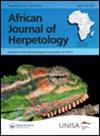A dwarf among giants: phylogenetic position of the elusive Angolan Adder (Bitis heraldica) and biogeographic affinities of Angolan Afromontane regions
IF 0.9
4区 生物学
Q3 ZOOLOGY
引用次数: 3
Abstract
ABSTRACT The Angolan Adder, Bitis heraldica (Bocage, 1889), is endemic to the Angolan central plateau and is one of the most poorly known and rarely observed species of African snakes. The phylogenetic placement of B. heraldica within the four subgenera of the genus Bitis (Bitis, Macrocerastes, Calechidna, Keniabitis) has been problematic. The few recent taxonomic and phylogenetic revisions dealing with African viperids and the genus Bitis have not included this species, resulting in the default acceptance of B. heraldica as member of the subgenus Calechidna, based on similar morphology and size. During a survey in Huambo Province, central Angola, we collected the first specimen of this species in the past 65 years, allowing us to examine its phylogenetic relationships to other Bitis using multigene Bayesian and maximum likelihood analyses of all species of Bitis, except B. harenna. Contrary to expectations that B. heraldica is a member of the subgenus Calechidna, our results unambiguously place B. heraldica among members of the subgenus Macrocerastes, which contains the largest-bodied species of the genus. The placement of B. heraldica within Macrocerastes raises interesting questions about body-size evolution in viperids and contributes to a better understanding of biogeographic patterns in south-western Africa, and particularly Angola.巨人中的侏儒:难以捉摸的安哥拉蝰蛇(Bitis heraldica)的系统发育位置和安哥拉非洲山区的生物地理亲和力
安哥拉蝰蛇(Bitis heraldica, Bocage, 1889)是安哥拉中部高原特有的一种非洲蛇,是最不为人所知和很少观察到的一种。纹章B. heraldica在Bitis属四个亚属(Bitis, Macrocerastes, Calechidna, Keniabitis)中的系统发育定位一直存在问题。最近关于非洲毒蛇属和刺刺属的几次分类和系统发育修订没有将该种包括在内,导致基于相似的形态和大小,默认接受刺刺属作为刺刺亚属的成员。在安哥拉中部万博省的一次调查中,我们收集了该物种在过去65年来的第一个标本,使我们能够使用多基因贝叶斯和最大似然分析来检查它与其他Bitis物种的系统发育关系,除了B. harenna。我们的研究结果明确地表明,B. heraldica属于大角蝉亚属(Macrocerastes)的成员,而大角蝉是该属中体型最大的物种。在macrocerecastes中的纹章杆菌的位置提出了关于毒蛇体型进化的有趣问题,并有助于更好地理解非洲西南部,特别是安哥拉的生物地理模式。
本文章由计算机程序翻译,如有差异,请以英文原文为准。
求助全文
约1分钟内获得全文
求助全文
来源期刊

African Journal of Herpetology
ZOOLOGY-
CiteScore
3.00
自引率
6.70%
发文量
15
审稿时长
>12 weeks
期刊介绍:
African Journal of Herpetology (AJH) serves as an outlet for original research on the biology of African amphibians and reptiles. AJH is an interdisciplinary journal that publishes original articles and reviews from diverse fields and disciplines, such as conservation, phylogenetics, evolution, systematics, performance, physiology, ecology, behavioural ecology, ethology, and morphology.
The Journal publishes two issues a year. There are no page charges .
 求助内容:
求助内容: 应助结果提醒方式:
应助结果提醒方式:


